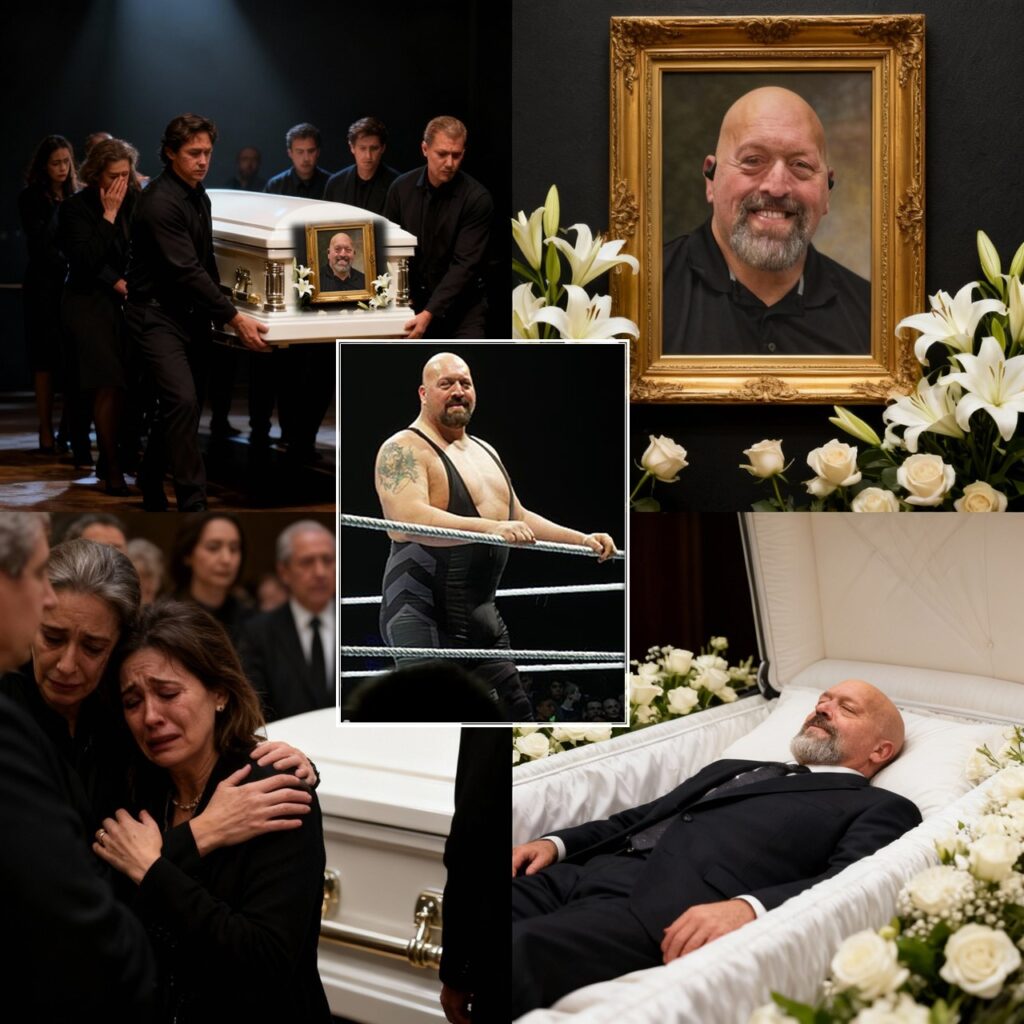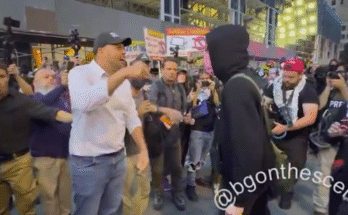
By Jonh smith, Global Correspondent | November 8, 2025
1. The Breaking News: A Somber Silence Falls
The world of sports entertainment and Hollywood is reeling tonight with the heartbreaking news that Paul Donald Wight II — known to millions as “The Big Show” — has passed away at the age of 53. The beloved WWE icon, actor, and gentle giant of both ring and screen reportedly uttered his final ten words surrounded by family and close friends: “Thank you all — for the love, the laughter, and life.”
Those words, simple yet profoundly human, now echo across a stunned global community — from the arenas where he towered above roaring crowds, to the quiet homes of fans who grew up watching him redefine what strength and compassion could look like inside and outside the squared circle.
As news broke late Friday evening, a wave of tributes began flooding social media platforms, each one a testament to a man whose presence, though physically immense, was matched only by the depth of his humility and warmth.
2. A Towering Career Built on Heart and Resilience
Born in Aiken, South Carolina, in 1972, Paul Donald Wight II rose from humble beginnings to become one of the most recognizable figures in the history of professional wrestling. Standing at an astonishing 7 feet tall and weighing over 400 pounds, Wight’s sheer physicality once made him an enigma. Diagnosed with acromegaly, a rare hormonal condition that accelerated his growth, Wight turned what could have been a lifelong struggle into a source of pride — a living symbol of perseverance.
Discovered in the mid-1990s by World Championship Wrestling (WCW), Wight first entered the public eye as “The Giant,” where his agility, charisma, and surprising athleticism defied stereotypes. By 1999, he had joined the World Wrestling Federation (later WWE), where the name “Big Show” would become legendary.
Over the next two decades, Wight dominated storylines and arenas alike, facing icons such as The Rock, Stone Cold Steve Austin, Brock Lesnar, and The Undertaker. His career wasn’t just defined by brute force, but by an almost Shakespearean depth — a performer who could pivot from villain to hero, thunderous rage to quiet humor, with disarming sincerity.
In an industry built on spectacle, Wight brought authenticity. Whether hoisting championship belts or sharing vulnerable moments in documentaries and interviews, he remained grounded — reminding audiences that behind the persona was Paul, a man driven by family, loyalty, and love for his craft.

3. Beyond the Ring: The Man Behind the Legend
Outside the arena lights, Paul Wight was far more than a superstar — he was a devoted husband, loving father, and tireless mentor to younger generations. Colleagues remember him as the “gentle heartbeat” of the locker room — the one who stayed late after shows to offer advice, share stories, or simply listen.
John Cena once said of Wight, “You could always tell when Paul was in the building — not because of his size, but because of his kindness. He filled the room with it.”
Wight also crossed over into Hollywood, appearing in films and television series such as The Waterboy, Jingle All the Way, and Netflix’s The Big Show Show — a self-aware comedy that revealed his charming, self-deprecating humor. In these roles, fans saw another side of him: a man unafraid to laugh at himself, to embrace his larger-than-life image while grounding it in authenticity.
He was equally passionate about charity work. Over the years, Wight lent his voice and resources to children’s hospitals, anti-bullying campaigns, and organizations supporting those with growth disorders. He once said, “If I can make a kid smile, if I can make them feel strong when they don’t, that’s my championship belt.”
4. The Final Days: Grace Amid the Battle
In recent months, close sources revealed that Wight had been privately battling a serious undisclosed illness. True to form, he chose to face it away from the glare of publicity, surrounded instead by the unwavering support of his family.
Those near him described his final weeks as a time of reflection and gratitude — moments spent watching old matches with his children, sharing laughter with friends, and offering reassurance to those around him.
One longtime WWE colleague, speaking through tears, shared, “He didn’t want anyone to see him as sick. He wanted people to remember him laughing, teaching, performing — being the Big Show.”
When the end came, family members said, it was peaceful. His final words — a soft-spoken farewell filled with gratitude — were not a goodbye, but a benediction to the millions whose lives he touched.

5. The World Responds: Tributes Across Generations
Almost immediately after the announcement, tributes poured in from every corner of the globe.
Dwayne “The Rock” Johnson posted on Instagram: “Heartbroken. Paul wasn’t just a giant in the ring — he was a giant in spirit. We laughed, we fought, we lived the dream together. Rest easy, brother.”
John Cena wrote, “There was no one like him — and there never will be. Thank you, Paul, for the lessons, the laughter, and the love you shared with all of us.”
WWE’s official statement called him “a cornerstone of sports entertainment — a performer who gave everything to his fans and his family, both in and out of the ring.”
Across social media, hashtags like #ThankYouBigShow and #ForeverGiant trended globally. Fans shared stories of meeting him at live events, recalling his surprising gentleness and humor. Many spoke of how he inspired them to embrace their differences, to turn perceived weaknesses into strengths.
6. A Legacy Etched in Strength, Humanity, and Hope
Paul Wight’s legacy transcends championships and fame. It lies in the lives he touched — in the children who found courage through his story, in the colleagues he guided, and in the millions who saw in him not just a wrestler, but a reminder that greatness comes from the heart.
In the world of sports entertainment, where personas often outshine people, Wight’s enduring gift was his humanity. His story — that of a man who transformed pain into power and fame into purpose — remains one of the most resonant in WWE history.
He once reflected in an interview, “People think strength is about how much you can lift. But it’s really about how much you can love.”
That philosophy defined him, both as a performer and as a man.

7. The Ethics of Farewell: Remembering with Respect
As tributes pour in and documentaries inevitably follow, journalists and fans alike face the delicate task of honoring his memory without intruding on his family’s grief.
Media outlets have been urged to respect the privacy of his wife, Bess Katramados, and their children. The Wight family’s statement, released early Saturday morning, read simply:
“Paul was our light, our laughter, and our hero. He taught us to face life with courage and compassion. We ask for love and privacy as we remember the man who meant everything to us.”
In an age of viral headlines and sensationalism, the story of Paul Wight stands as a reminder that behind every public figure lies a private soul — deserving of grace, dignity, and peace.
8. Closing: The Giant Who Never Truly Left

Tonight, as the world mourns, there’s a quiet truth settling among fans and friends alike — Paul Donald Wight II may have left the arena, but his presence will never fade. His laughter still echoes in the locker rooms he once filled. His wisdom lives on in those he mentored. And his heart — vast and steady as the man himself — continues to beat in the millions he inspired.
Somewhere, perhaps in the great beyond, the lights of an imaginary arena shine one last time. The crowd rises, chanting not for the spectacle, but for the man:
“Thank you, Big Show.”
And if you listen closely, you can almost hear his gentle voice in return — that final message of gratitude and grace:
“Thank you all — for the love, the laughter, and life.”
[End of Article | ©2025 Global News Network | All Rights Reserved]


